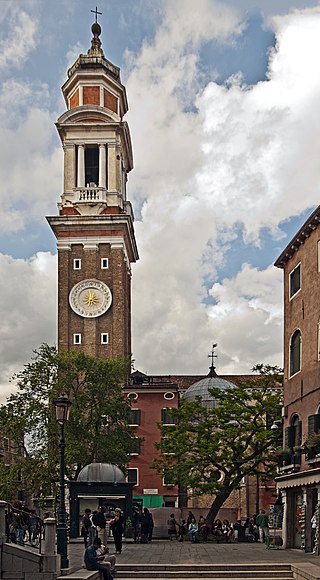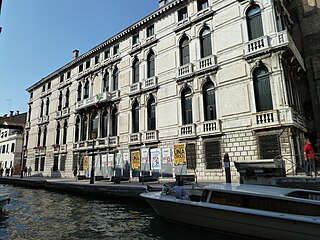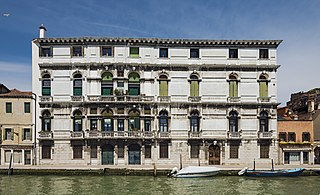
The Bridge of Sighs is a bridge in Venice, Italy. The enclosed bridge is made of white limestone, has windows with stone bars, passes over the Rio di Palazzo, and connects the New Prison to the interrogation rooms in the Doge's Palace. It was designed by Antonio Contino, whose uncle Antonio da Ponte designed the Rialto Bridge. It was built in 1600.

Cannaregio is the northernmost of the six historic sestieri (districts) of Venice. It is the second largest sestiere by land area and the largest by population, with 13,169 people as of 2007.

The Grand Canal is a channel in Venice, Italy. It forms one of the major water-traffic corridors in the city.

The Rialto Bridge is the oldest of the four bridges spanning the Grand Canal in Venice, Italy. Connecting the sestieri (districts) of San Marco and San Polo, it has been rebuilt several times since its first construction as a pontoon bridge in 1173, and is now a significant tourist attraction in the city.

The Ponte delle Guglie is one of two bridges in Venice, Italy, to span the Cannaregio Canal. It lies near the western end of the canal, by the Venezia Santa Lucia railway station.

Comacchio is a town and comune of Emilia Romagna, Italy, in the province of Ferrara, 48 kilometres (30 mi) from the provincial capital Ferrara. It was founded about two thousand years ago; across its history it was first governed by the Exarchate of Ravenna, then by the Duchy of Ferrara, and eventually returned to be part of the territories of the Papal States. For its landscape and its history, it is considered one of the major centres of the Po delta.

The Ponte degli Scalzi, is one of only four bridges in Venice to span the Grand Canal.

Andrea Tirali was an Italian architect working in Venice and the Veneto. He was responsible for the intricate design of the pavement in the Piazza San Marco in Venice.

The Venice Marathon is a marathon road race that has been held each year in Venice since 1986, usually in October. The course starts in Stra and passes through Mestre, Parco San Giuliano, and Ponte della Libertà before ending at Riva dei Sette Martiri in Venice. The marathon is categorized as a Bronze Label Road Race by World Athletics.

The Church of St Job is a 15th-century Roman Catholic church located overlooking the campo of the same name, known as Sant'Agiopo in Venetian dialect, on the south bank of the Cannaregio canal near Ponte dei Tre Archi in the sestiere of Cannaregio of Venice, northern Italy,

The Chiesa dei Santi Apostoli di Cristo, commonly called San Apostoli, is a 7th-century Roman Catholic church located in the Cannaregio sestiere of the Italian city of Venice. It is one of the oldest churches in the city and has undergone numerous changes since its foundation. The present building is the result of a major reconstruction project which was undertaken in 1575. The church is notable particularly for the Cornaro Chapel, an important example of Early Renaissance architecture, added by Mauro Codussi during the 1490s. The chapel is the burial place of several members of the powerful Cornaro family, including Catherine Cornaro, Queen of Cyprus and Armenia. The church houses several works of art including pieces by Giambattista Tiepolo and Paolo Veronese.

The Palazzo Cendon is a minor 15th-century palace recognized by some as a small palace by 1501 in Venice, Italy, located just off the southern promenade of the Cannaregio Canal, about 200 feet east of Rio della Crea.
Currently it is used as a Residence de Charme.

The church of Santa Maria delle Penitenti, is part of a large complex: Pio Loco delle Penitenti, located on the canal Cannaregio, near its exit to the lagoon facing Mestre, in the Northwest edge of Venice, Italy. It gained its name as a charitable institution providing an alternative life to former prostitutes, akin to a Magdalene asylum.

The Palazzo da Lezze or Ca' Lezze is a Baroque palace in Sestiere of Cannaregio in the city of Venice, Italy. It is located on Rio della Misericordia, with a facade on the fondamenta (canal-sidewalk), and stands between the Scuola Grande Nuova della Misericordia and Calle Largo Lezze.

The Riva degli Schiavoni is a monumental waterfront in Venice. It is located in the sestiere of Castello and extends along the San Marco basin in the stretch from the Ponte della Paglia bridge, close to the Doge's Palace to the rio di Ca' di Dio.

View of the Cannaregio Canal is a small oil-on-canvas painting executed ca. 1770 by the Italian painter Francesco Guardi. It measuring 48.9 × 77.5 cm. It is now in the reading room of the Frick Art Reference Library alongside the Regatta in Venice. Both paintings were gifted to the Frick Collection by Helen Clay Frick after her father's death. In the painting, Guardi captures a typical scene of Venetian life on the canals. In this particular veduta, Guardi depicts a section of the northern bank of the Cannaregio Canal, one of Venice’s largest canals, located in the Cannaregio sestiere (district) of the city.

Palazzo Surian Bellotto is a Baroque palace in Venice, Italy. The palazzo is located in the Cannaregio district and overlooks the Cannaregio Canal.


















